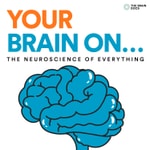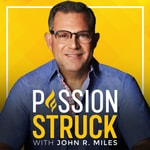Your Brain On – Détails, épisodes et analyse
Détails du podcast
Informations techniques et générales issues du flux RSS du podcast.

Your Brain On
Drs. Ayesha and Dean Sherzai
Fréquence : 1 épisode/10j. Total Éps: 54

Classements récents
Dernières positions dans les classements Apple Podcasts et Spotify.
Apple Podcasts
🇨🇦 Canada - science
01/08/2025#53🇺🇸 États-Unis - science
27/07/2025#100🇨🇦 Canada - science
26/07/2025#84🇺🇸 États-Unis - science
26/07/2025#74🇨🇦 Canada - science
25/07/2025#74🇺🇸 États-Unis - science
25/07/2025#58🇨🇦 Canada - science
24/07/2025#59🇺🇸 États-Unis - science
24/07/2025#83🇺🇸 États-Unis - science
23/07/2025#95🇺🇸 États-Unis - science
22/07/2025#89
Spotify
Aucun classement récent disponible
Liens partagés entre épisodes et podcasts
Liens présents dans les descriptions d'épisodes et autres podcasts les utilisant également.
See all- https://thebraindocs.com/
88 partages
- https://www.bluezones.com/
86 partages
- https://lisafeldmanbarrett.com/
68 partages
- https://www.instagram.com/thebraindocs
112 partages
- https://www.instagram.com/unbiasedscipod
58 partages
- https://www.instagram.com/satchin.panda
51 partages
- https://www.youtube.com/@RenaMalikMD
217 partages
- https://youtube.com/thebraindocs
4 partages
Qualité et score du flux RSS
Évaluation technique de la qualité et de la structure du flux RSS.
See allScore global : 73%
Historique des publications
Répartition mensuelle des publications d'épisodes au fil des années.
Your Brain On... Meditation
Saison 3 · Épisode 4
mercredi 28 août 2024 • Durée 59:43
Meditation: an ancient practice with brain health benefits proven by modern science.
Whether you’re focusing on your breathing to quieten peripheral distractions or using mindfulness to rebalance your emotional reactivity to everyday stresses, practicing meditation can spark long-term neuroplastic changes that will help you feel more attentive and calm in everything you do.
In ‘Your Brain On... Meditation’, we explore:
• How meditation alters your brain chemistry and ‘retrains’ your broader nervous system
• The neuroscience of attention and focus, including your default mode and salience networks
• Using mindfulness to break phone addiction, reduce stress, improve relationships, and practice self-care
• The studies which highlight the long-term cognitive benefits of meditation
• How we can all make time for meditation, no matter how busy our schedules
• The limitations and risks of meditation apps
Joining us for this important conversation are three fantastic guests:
DR. AMISHI JHA, a Professor of Psychology at the University of Miami, a pioneer in the study of mindfulness and attention, and the author of the acclaimed book ‘Peak Mind’
DR. CLIFFORD SARON, a neuroscientist and Associate Research Scientist at the Center for Mind and Brain at the University of California, Davis, renowned for his work on the neurobiological effects of meditation
DR. HELEN LAVRETSKY, a Professor of Psychiatry at UCLA and a leading researcher in geriatric psychiatry, who has extensively studied the effects of meditation and yoga on mental health and aging
‘Your Brain On’ is hosted by neurologists, scientists and public health advocates Ayesha and Dean Sherzai.
Drs. Ayesha and Dean are now welcoming patients via the Brain Health Institute: https://brainhealthinstitute.com/
‘Your Brain On... Meditation’ • SEASON 3 • EPISODE 4
—
LINKS
Dr. Amishi Jha:
Book: https://www.amazon.com/gp/aw/d/0062992155/ref=tmm_pap_swatch_0?ie=UTF8&qid=&sr=
On Instagram: https://www.instagram.com/amishipjha/
On Twitter: https://x.com/amishijha
Dr. Clifford Saron:
Center for Mind and Brain: https://mindbrain.ucdavis.edu/people/clifford-saron
Dr. Helen Lavretsky:
At UCLA: https://www.uclahealth.org/providers/helen-lavretsky
Study on yogic meditation for dementia caregivers: https://www.ncbi.nlm.nih.gov/pmc/articles/PMC3423469/
Your Brain On... Leg Strength
Saison 3 · Épisode 3
mercredi 21 août 2024 • Durée 33:48
Leg strength isn’t just about physical health. There are enormous benefits for brain health, too.
From the more obvious benefits for balance and mobility to the deeper neurochemical machinery that powers the production and transportation of brain-boosting proteins, leg strength has a far greater influence on brain health than we might expect.
In this episode of ‘Your Brain On...’, we discuss:
• The prevalence of injuries caused by falls in elderly populations (and how leg strength can help counter this problem)
• How brain-boosting chemicals like BDNF are produced by resistance exercise
• What actually happens to our muscles when we grow them with regular exercise
• How we can all work on our leg strength, regardless of age and ability
• The importance of rest, recovery, and nutrition in an effective exercise regime
Joining us for this discussion are the immensely knowledgeable Dr. Stuart Phillips, a Professor in the Department of Kinesiology at McMaster University, and Dr. Kirk Erickson, Associate Professor in the Dept. of Psychology at the University of Pittsburgh (and an expert in the area of exercise and cognitive health).
‘Your Brain On’ is hosted by neuroscientists and public health advocates Ayesha and Dean Sherzai.
‘Your Brain On... LEG STRENGTH’ • SEASON 3 • EPISODE 3
———
LINKS
Dr. Stuart Phillips at McMaster University: https://mira.mcmaster.ca/our-faculty/stuart-phillips/
Dr. Stuart Phillips on Twitter: https://x.com/mackinprof
Dr. Kirk Erickson at the University of Pittsburgh: https://www.psychology.pitt.edu/people/kirk-erickson-phd
———
REFERENCES (Studies Dr. Erickson referred to in the show):
-
Colcombe, S. J., Erickson, K. I., Raz, N., et al. (2003). Aerobic fitness reduces brain tissue loss in aging humans. The Journals of Gerontology Series A: Biological Sciences and Medical Sciences, 58(2), M176-M180. https://pubmed.ncbi.nlm.nih.gov/12586857/
-
Colcombe, S. J., Erickson, K. I., Scalf, et al. (2006). Aerobic exercise training increases brain volume in aging humans. The Journals of Gerontology Series A: Biological Sciences and Medical Sciences, 61(11), 1166-1170. https://pubmed.ncbi.nlm.nih.gov/17167157/
———
FOLLOW US
Join the NEURO Academy: NEUROacademy.com
Instagram: @thebraindocs
Website: TheBrainDocs.com
More info and episodes: TheBrainDocs.com/Podcast
Your Brain On... Fats
Saison 2 · Épisode 4
mercredi 22 mai 2024 • Durée 01:00:33
Fat can have a bad reputation, but certain fats are essential for the healthy functioning of your brain.
Between government guidelines, fad diets, and our endless social feeds, nutrition advice overload has left us all a bit lost with how to incorporate healthy fats into what we eat.
In this episode, we discuss:
• The different kinds of fats (saturated vs. unsaturated) and which ones we actually need to consume
• The myth that “because your brain is primarily made of fat, it thrives on a high-fat diet”
• How the cardiovascular damage caused by saturated fats can increase the risk of cognitive decline and dementia
• All the tasty ways you can get more healthy, unsaturated, essential fats into your meals
We welcome esteemed nutrition scientist Dr. Alan Flanagan back to the show, to explore the history of research into the impact of fats and how it shaped one of the most robust bodies of evidence in all of science.
We’re also joined by Dr. Danielle Belardo, renowned cardiologist and science communicator, to talk about the interplay between heart health, brain health, and fats, the controversy around statins, the low-down on LDL cholesterol, and the future of cardiovascular interventions.
‘Your Brain On’ is hosted by neuroscientists and public health advocates Ayesha and Dean Sherzai.
‘Your Brain On... FATS’ • SEASON 2 • EPISODE 4
LINKS
Dr. Alan Flanagan:
Alan on Instagram: https://www.instagram.com/thenutritionaladvocate
Alinea Nutrition: https://www.alineanutrition.com/
Dr. Danielle Belardo:
Dr. Belardo’s website: https://www.daniellebelardomd.com/
Practical, Evidence-Based Approaches to Nutritional Modifications to Reduce Atherosclerotic Cardiovascular Disease: https://pubmed.ncbi.nlm.nih.gov/35284849/
FOLLOW US
Join the NEURO Academy: NEUROacademy.com
Instagram: @thebraindocs
Website: TheBrainDocs.com
More info and episodes: TheBrainDocs.com/Podcast
REFERENCES
Scientific articles discussed in this episode:
Mensink, Ronald P., and World Health Organization. Effects of saturated fatty acids on serum lipids and lipoproteins: a systematic review and regression analysis. World Health Organization, 2016.
Okereke, Olivia I., et al. “Dietary fat types and 4‐year cognitive change in community‐dwelling older women.” Annals of neurology 72.1 (2012): 124-134.
Simian Diet paper: Kendall, Cyril WC, and David JA Jenkins. “A dietary portfolio: maximal reduction of low-density lipoprotein cholesterol with diet.” Current atherosclerosis reports 6.6 (2004): 492-498.
Solomon, Alina, et al. “Midlife serum cholesterol and increased risk of Alzheimer’s and vascular dementia three decades later.” Dementia and geriatric cognitive disorders 28.1 (2009): 75-80.
Morris, Martha Clare, et al. “Dietary fats and the risk of incident Alzheimer disease.” Archives of neurology 60.2 (2003): 194-200.
Keys, Ancel, Joseph T. Anderson, and Francisco Grande. “Prediction of serum-cholesterol responses of man to changes in fats in the diet.” Lancet 273 (1957): 959-966
Anitschkow, N. N., and S. Chalatow. 1913. Ueber experimentelle Cholesterinsteatose und ihre Bedeutung fur die Entstehung eini- ger pathologischer Prozesse. Zentralbl. Allg. Pathol. 24: 1–9.
Keys, Ancel, et al. “The seven countries study: 2,289 deaths in 15 years.” Preventive medicine 13.2 (1984): 141-154.
Sherzai, Ayesha Z., Alexander N. Sherzai, and Dean Sherzai. "A systematic review of omega-3 consumption and neuroprotective cognitive outcomes." American Journal of Lifestyle Medicine 17.4 (2023): 560-588.
Rajan, Kumar B., et al. "Statin Initiation and Risk of Incident Alzheimer Disease and Cognitive Decline in Genetically Susceptible Older Adults." Neurology 102.7 (2024): e209168.
Olmastroni, Elena, et al. "Statin use and risk of dementia or Alzheimer’s disease: a systematic review and meta-analysis of observational studies." European journal of preventive cardiology 29.5 (2022): 804-814.
Your Brain On... Hearing Loss
Saison 2 · Épisode 3
mercredi 15 mai 2024 • Durée 40:23
How does hearing loss change the brain and contribute to cognitive decline?
The human capacity to hear is incredible. In milliseconds, sound vibrations are transformed into mechanical energy, then sensorineural signals, and then, in our brains, a universe of meaning and memory.
When that sense begins to fade, either due to aging or because of causative damage, our brains can become understimulated, potentially leading to the onset of neurodegenerative diseases like Alzheimer’s.
But, with accessibility research, technology, and policy continuing to strengthen and converge, the future promises to be brighter for everyone experiencing hearing loss.
In this episode of ‘YOUR BRAIN ON...’, we discuss:
• The different kinds and causes of hearing loss
• The relationship between aging and hearing loss
• The neurological distinction between ‘hearing’ and ‘listening’
• The recent groundbreaking studies which have made the link between hearing loss and cognitive decline clearer than ever
• How associated conditions like tinnitus impact the brain
• What’s coming next in hearing aid technology
This episode, we’re joined by:
DR. FRANK LIN, Director of the Cochlear Center for Hearing and Public Health at Johns Hopkins, who headed major research into how hearing loss contributes to increased risk of neurodegenerative disease.
DR. DOUGLAS BECK, renowned audiologist and co-host of the Hearing Matters podcast, who talks about the past and future of hearing aid devices, how to protect your hearing, and why listening — not hearing — is a whole-brain event.
DR. KRISTIN BARRY, researcher and tinnitus expert, who breaks down the various types of tinnitus and explains how the effects of tinnitus can be observed in the brain.
‘Your Brain On’ is hosted by neuroscientists and public health advocates Ayesha and Dean Sherzai.
‘Your Brain On... HEARING LOSS’ • SEASON 2 • EPISODE 3
LINKS
Dr. Frank Lin
Johns Hopkins Cochlear Center for Hearing and Public Health: https://jhucochlearcenter.org/
The Hearing Number: https://hearingnumber.org/
Dr. Douglas Beck
Dr. Beck’s website: http://www.douglaslbeck.com/
The Hearing Matters podcast: https://hearingmatterspodcast.com/
Dr. Kristin Barry
Dr. Barry at the University of Western Australia: https://research-repository.uwa.edu.au/en/persons/kristin-barry
Dr. Barry’s TEDx talk: https://www.youtube.com/watch?v=JKY-hohg8wM
FOLLOW US
Join the NEURO Academy: NEUROacademy.com
Instagram: @thebraindocs
Website: TheBrainDocs.com
More info and episodes: TheBrainDocs.com/Podcast
Your Brain On... Comedy
Saison 2 · Épisode 2
mercredi 8 mai 2024 • Durée 22:37
Laughter predates language. But what’s the neurological function of humor? Why do we find things funny?
Your brain’s ability to perceive and create comedic ideas is one of the most powerful facets of the human experience. Through humor and laughter, we can find shared understanding across the boundaries of cultures, languages, and ideologies.
In this episode of ‘YOUR BRAIN ON...’, we discuss:
• Why we evolved the ability to laugh
• The ‘benign violation theory’ — the most prevalent hypothesis for the function of humor
• Why we find some things funny, and some things not
• How some comedians use humor as a form of therapy
• The nervous disorders underpinning involuntary bursts of laughter
This episode, we’re joined by:
CALEB WARREN, a primary contributor of the Humor Research Lab (HuRL) at the University of Colorado, and a key pioneer of the Benign Violation Theory, which he speaks about in this episode.
JESSICA PORTER, an hilarious comedian who uses humor both for performances and for therapy. Jessica shares some fascinating ideas about comedy as a tool for communication and growth.
‘Your Brain On’ is hosted by neuroscientists and public health advocates Ayesha and Dean Sherzai.
‘Your Brain On... COMEDY’ • SEASON 2 • EPISODE 2
LINKS
The Humor Research Lab at University of Colorado: https://humorresearchlab.com/
Jessica Porter on Instagram: https://www.instagram.com/jess_porter_standup
Jessica’s podcast, Sleep Magic: https://podcasts.apple.com/us/podcast/sleep-magic-sleep-hypnosis-meditations/id1650407051
FOLLOW US
Join the NEURO Academy: NEUROacademy.com
Instagram: @thebraindocs
Website: TheBrainDocs.com
More info and episodes: TheBrainDocs.com/Podcast
Your Brain On... Space Travel
Saison 2 · Épisode 1
mercredi 1 mai 2024 • Durée 52:23
Space travel goes against a million years of human evolution. So how does it affect our brains?
In just six decades of manned space flights, we’ve discovered a remarkable amount about the neurological effects of venturing to the stars.
In this episode of ‘YOUR BRAIN ON...’ we discuss:
• How low gravity changes your brain structure, impacts your balance, and... actually might improve your sleep
• The cognitive dangers of space travel, from the mania of isolation to the destructive forces of cosmic radiation
• Why we’re evolutionary drawn to explore other worlds and believe in aliens
• What spaceflight can teach us about neuroplasticity and cogntive decline
This episode, we’re joined by:
DR. JAY BUCKEY, astronaut and space physiologist, who, in 1998, was part of the Neurolab mission, going to space for 16 days to study the effects of spaceflight on the brain and nervous system.
DR. SHEYNA GIFFORD, aerospace medic, who famously spent a year in a simulation of Mars on a volcano in Hawaii, to study the psychological impacts of long-term space travel.
DR. RACHAEL SEIDLER, Professor in the Department of Applied Physiology and Kinesiology at the University of Florida, and an expert on spaceflight’s affects on neuroplasticity.
EMILY CALANDRELLI, renowned science educator and engineer, who highlights how what we learn while exploring space greatly benefits our lives down here on Earth.
‘Your Brain On’ is hosted by neuroscientists and public health advocates Ayesha and Dean Sherzai.
‘Your Brain On... SPACE TRAVEL’ • SEASON 2 • EPISODE 1
👉 LINKS
Dr. Jay Buckey at Dartmouth: https://geiselmed.dartmouth.edu/faculty/facultydb/view.php/?uid=426
Dr. Sheyna Gifford’s website: https://sheynagifford.com/
Dr. Rachael Seidler at University of Florida: https://hhp.ufl.edu/about/faculty-staff/seidler_rachael/
Dr. Rachael Seidler on Twitter (AKA ‘X’): https://twitter.com/SeidlerRachael
Emily Calandrelli’s website, ‘The Space Gal’: https://www.thespacegal.com/
Emily Calandrelli on Instagram: https://www.instagram.com/thespacegal
Emily Calandrelli on TikTok: https://www.tiktok.com/@thespacegal
👉 FOLLOW US
Join the NEURO Academy: NEUROacademy.com
Instagram: @thebraindocs
Website: TheBrainDocs.com
More info and episodes: TheBrainDocs.com/Podcast
Your Brain On... Presidential Aging
Saison 1 · Épisode 10
mercredi 3 avril 2024 • Durée 33:20
The U.S. is set to have its oldest President ever. Should we be worried, or are we thinking about aging the wrong way?
The unprecedented age of the two United States presidential candidates, Biden and Trump, has sparked fiery debates over whether a leader can be ‘too old’ to effectively run a country.
Our guest for this episode, neuroscientist Dr. Charan Ranganath, recently published a New York Times op-ed offering an alternative view: age itself may not be a useful metric for measuring how successfully a president might lead the nation.
In this episode of ‘Your Brain On’, we discuss:
• The different types of memory, and how they work
• How our brains can remain more resilient than is often thought in older age
• Historic figures who have made significant contributions to the world during their twilight years
• The inspiring power of our cognitive reserve
We’re also joined by longevity expert Dan Buettner, renowned for his work on ‘The Blue Zones’ — parts of the world with longer life expectancy — for a conversation about why having an older leader might not be an inherently bad thing.
This is the SEASON ONE FINALE of Your Brain On. Thank you so much for listening! We return in May 2024 with ten more exhilarating stories about the world through a neuroscientific lens.
‘Your Brain On’ is hosted by neuroscientists and public health advocates Ayesha and Dean Sherzai.
‘Your Brain On... Presidential Aging’ • SEASON 1 • EPISODE 10
Daniel Kahneman, the Nobel Prize-winning psychologist and celebrated author, who Dr. Charan Ranganath mentioned during our conversation, sadly passed away the week before we recorded this episode. We dedicate this episode to his memory, and his work.
———
LINKS
Dr. Charan Ranganath
His website: https://charanranganath.com/
His new book, ‘Why We Remember’: https://www.penguinrandomhouse.com/books/705542/why-we-remember-by-charan-ranganath-phd/
At UC Davis: https://psychology.ucdavis.edu/people/charan
Dan Buettner
His website: https://danbuettner.com/
Blue Zones: https://www.bluezones.com/
On Instagram: https://www.instagram.com/danbuettner
———
FOLLOW US
Join the NEURO Academy: NEUROacademy.com
Instagram: @thebraindocs
Website: TheBrainDocs.com
More info and episodes: TheBrainDocs.com/Podcast
Your Brain On... Cardio
Saison 1 · Épisode 9
mercredi 27 mars 2024 • Durée 34:01
A healthier heart equals a healthier brain — no surprise there — but what’s the neuroscience behind the benefits of a cardio workout?
Cardiovascular exercise, be it a brisk stroll, a light jog, or an intense interval training session, releases neurotransmitters that can improve your mood, reduce stress, enhance your memory, and strengthen immunity.
In this episode of ‘Your Brain On’, we discuss:
• How your brain and your body respond to increasingly challenging aerobic workouts
• The neurochemistry of phenomena like ‘feeling the burn’ and ‘runner’s high’
• How the protein BDNF, triggered by exercise, can reverse the effects of aging and cognitive decline
• Ways to integrate more cardio exercise into your life, no matter which hurdles each day brings
We speak to Dr. John Ratey, author of ‘Spark’, widely celebrated as one of THE go-to books about how exercise benefits the brain. He shares the story that led him to write the book, about a school which favored fitness over sports skills in its PE classes and subsequently ranked amid the smartest schools in the world.
We’re also joined by Dr. Art Kramer, Professor of Psychology and Director of the Center for Cognitive & Brain Health at Northeastern University, who dismisses the idea that you can be ‘too old to exercise’.
And we invite anti-influencer and social media personality Erin Azar, AKA Mrs. Space Cadet, to the show, to talk about how her videos, which show the less glamorous side of running and exercise, went viral and spawned a community of nearly one-million followers.
‘Your Brain On’ is hosted by neuroscientists and public health advocates Ayesha and Dean Sherzai.
‘Your Brain On... Cardio • SEASON 1 • EPISODE 9
———
LINKS
Our ‘Mastering Memory’ training webinar: https://thebraindocs.com/memory/
Dr. John Ratey
Website and books: https://www.johnratey.com/
Dr. Art Kramer
At Northeastern University College of Science: https://cos.northeastern.edu/people/art-kramer/
Erin Azar, “Mrs. Space Cadet”
Instagram: https://www.instagram.com/immrsspacecadet
TikTok: https://www.tiktok.com/@mrs.space.cadet
———
FOLLOW US
Join the NEURO Academy: NEUROacademy.com
Instagram: @thebraindocs
Website: TheBrainDocs.com
More info and episodes: TheBrainDocs.com/Podcast
Your Brain On... Alzheimer’s
Saison 1 · Épisode 8
mercredi 20 mars 2024 • Durée 01:00:53
How does Alzheimer’s alter the brain, and how do we create a future without the disease?
Alzheimer’s, the most common form of dementia, threatens to single-handedly collapse our healthcare systems. But our knowledge of how to prevent it is stronger than ever.
In this episode of ‘YOUR BRAIN ON’, we discuss:
• The power of stories and the importance of community for finding comfort and confidence following an Alzheimer’s diagnosis
• What we know about preventing cognitive decline through brain-healthy living
• The neurochemistry of how Alzheimer’s physically changes the brain
• Genetic predisposition to neurodegenerative diseases, and why women have a higher risk of developing Alzheimer’s
• Why we should approach brain health in the same way we approach heart health
We’re joined by Dr. Lisa Genova, neuroscientist and writer of ‘Still Alice’, a book which allows the reader to step into the shoes of a woman experiencing the onset of Alzheimer’s. ‘Still Alice’ was adapted into a feature film, for which Julianne Moore won an Academy Award for Best Actress in 2015. Lisa talks to us about how stories can help us find a sense of hope and empathy in the face of ‘scary’ diagnoses.
Dr. Charles DeCarli, Director of the the University of California Davis Alzheimer’s Disease Center, explains a broad range of Alzheimer’s risk factors — from amyloid and tau proteins to cardiovascular diseases — and offers advice on thinking about brain health as part of the body’s wider functionality, not a standalone system.
And Dr. Lisa Mosconi, neuroscientist, educator, and author of ‘The Menopause Brain’, highlights how the hormonal shifts caused by menopause contribute to a higher prevalence of Alzheimer’s in women, and unpacks the controversial history and potential future of hormone replacement therapy.
‘Your Brain On’ is hosted by neuroscientists and public health advocates Ayesha and Dean Sherzai.
‘Your Brain On... ADHD • SEASON 1 • EPISODE 8
———
LINKS
Lisa Genova:
Website and books: https://www.lisagenova.com/
Instagram: https://www.instagram.com/authorlisagenova
Lisa Mosconi:
Website: https://www.lisamosconi.com/
Instagram: https://www.instagram.com/dr_mosconi
Book, ‘The Menopause Brain’: https://www.amazon.com/Menopause-Brain-Transition-Knowledge-Confidence/dp/0593541243
Dr. Charles DeCarli at UC Davis Health: https://health.ucdavis.edu/medical-center/team/639/charles-decarli---neurology---dementia---alzheimer-s-disease-sacramento/
———
FOLLOW US
Join the NEURO Academy: NEUROacademy.com
Instagram: @thebraindocs
Website: TheBrainDocs.com
More info and episodes: TheBrainDocs.com/Podcast
Your Brain On... Being A Woman
Saison 1 · Épisode 7
mercredi 13 mars 2024 • Durée 23:11
Are there differences between the brains of women and men?
In this episode of Your Brain On, we explore the unique aspects of the female brain, and how the male-biased history of medical science has left us with enormous gaps in our knowledge of women’s distinctive neurology.
We discuss:
• The striking uniformity in the structure of the female and male brain
• The possible physiological and sociological reasons why women have a higher risk of developing neurodegenerative diseases like Alzheimer’s
• The recent progress that’s been made in making neuroscientific studies more inclusive
• What current research says about Hormone Replacement Therapy, a common treatment for postmenopausal drops in neuroprotective hormones
We’re joined by Dr. Margaret McCarthy, James & Carolyn Frenkil Endowed Dean's Professor at the University of Maryland School of Medicine, where she is also Professor and Chair of the Department of Pharmacology, renowned for her research into the neuroscience of sex differences, and Dr. Lise Eliot, Professor of Neuroscience at the Chicago Medical School at Rosalind Franklin University of Medicine and Science.
‘Your Brain On’ is hosted by neurologists, scientists and public health advocates, Ayesha and Dean Sherzai.
‘Your Brain On... Being A Woman • SEASON 1 • EPISODE 7
———
LINKS
Dr. Margaret McCarthy’s website: https://www.mccarthylab.com/
Dr. Lise Eliot at Rosalind Franklin University: https://www.rosalindfranklin.edu/academics/faculty/lise-eliot/
———
FOLLOW US
Join the NEURO Academy: NEUROacademy.com
Instagram: @thebraindocs
Website: TheBrainDocs.com
More info and episodes: TheBrainDocs.com/Podcast









